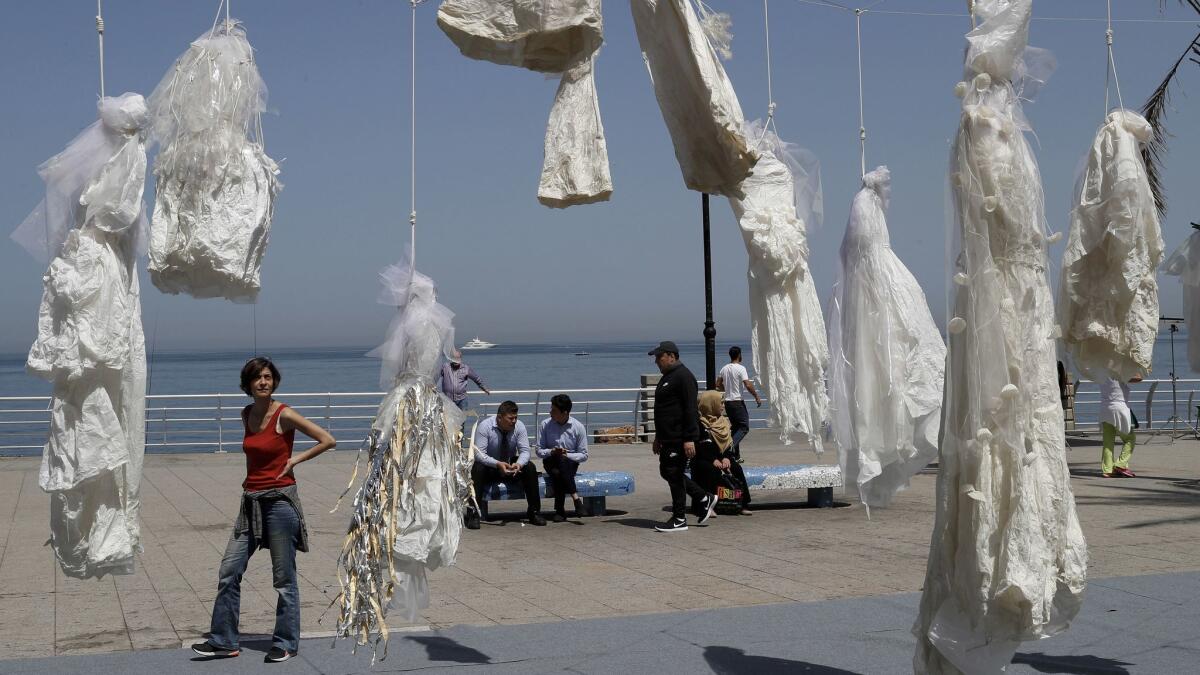Jordan looks to repeal long-reviled rape-marriage law

Reporting from Amman, Jordan â The bright, 14-year-old Jordanian girl lived with her family in the capital, Amman.
Her cousin, a taxi driver 10 years her senior, had twice asked the girlâs father for permission to marry her.
Both times she and her father had demurred: Lubna was too young, they said, and besides, she routinely ranked at the top of her class, and hoped to finish her studies and go on to become a doctor.
Soon after, Lubnaâs cousin picked her up from a hair salon in his taxi, drove her to a secluded spot and raped her.
Back then, in 1983, activist Asma Khader was a lawyer appointed by the criminal court to evaluate the damage inflicted on Lubna.
âHe brought me half conscious to my parentsâ house,â the teenager told Khader. âHe boasted, âIâve taken her. Now you have to marry her to me, and Iâm still ready to do so even though sheâs âdamaged.ââ
Lubna was referring to a long-reviled section of Jordanâs penal code, Article 308, that allows rapists to avoid prison if they marry their victims for at least three years in what its proponents said was a bid to protect victimsâ honor.
The law was amended last year to allow a rapist to marry a victim only if she was between the age of 15 and 18 and if the act was consensual. The cases were classified as rapes even if the sex was consensual because of the girlâs age.
And last month, Jordanâs Cabinet revoked Article 308, following the recommendations of a royal judiciary committee tasked with reforming the countryâs penal code. The decision requires ratification by Jordanâs parliament, which is expected to discuss and vote on the countryâs penal code in the coming months.
âIt has taken us almost 35 years to get here,â Khader said in a phone interview. In the intervening decades she has become a top womenâs rights campaigner and is executive director of the Sisterhood Is Global Institute, a nonprofit think tank.
According to Jordanâs Ministry of Justice, 159 rapists avoided punishment by marrying their victims from 2010 to 2013. The government, Khader said, stopped reporting figures after 2013 to avoid controversy. Victimsâ advocates say cases of rape are underreported in Jordanâs conservative society, as they are many places.
Other countries with similar conditions include Lebanon, where activists have been pushing parliament to abolish a law allowing rapists to marry their victims, known as Article 522.
âWe did a survey, and found that only 1% of Lebanese knew of this article. We set it as a challenge to create a wave of support to cancel this law,â said Alia Awada, advocacy and campaign manager for the womenâs rights organization ABAAD in a phone interview.
Among the ways activists have protested the law was to hang wedding dresses by nooses in a haunting display along Beirutâs corniche area. Billboards also featured tattered wedding dresses with the tagline, âWhite does not cover rape.â
In Jordan, supporters of Article 308 saw it as satter, or protection, for the victim, Khader said.
âThey believe that if the rapist doesnât marry the victim then she will have no chance to marry, and will even bring shame to the family and she could be killed so as to protect the familyâs honor.â
Khader said Lubnaâs case has stayed with her through the years.
âMost people submit, but Lubna and her father refused that she marry her cousin. And her refusal was something everyone mocked, in her extended family and even in the court,â Khader said.
âHer teacher didnât let her go back to her school. The family had to move ... to another area. All this because a man wanted this girl and took advantage of this law.â
Khader said she and Lubna have stayed in touch. (Lubna declined to be interviewed for this article, and asked not to be identified by her surname for privacy reasons.)
âSheâs now a doctor, and she married one of her colleagues. She lives well,â said Khader. But she was the exception: The fight to repeal 308, Khader said, is for those women who werenât able to refuse.
Our problem in all of these things, whether itâs human rights or womenâs rights, is ignorance.
— Ghada Saba, activist
Rana Husseini, a journalist and author of âMurder in the Name of Honor,â is among those who are hopeful that Jordanâs parliament will take the final step to eliminate the law.
âItâs timely. In the past, the government didnât even acknowledge we had a problem and it wasnât interested in changing any laws,â Husseini said in a phone interview.
She said previous attempts to repeal articles that were unfair to women, including 308 and 98, which allowed perpetrators of so-called honor killings to go free after six months, had been met with a lot of resistance. Article 98 remains on the books.
âSociety wasnât ready, and we didnât do proper lobbying, so there was a backlash,â Husseini said.
Egypt and Morocco ended their ârape marriageâ laws in 1999 and 2014, respectively. But most countries in the region still have such laws.
Suad Abu-Dayyeh, a regional consultant for Equality Now, a human rights organization, said the move against Article 308 had come as âa result of the accumulation of the efforts of civil society over the years to change such laws.â
Abu-Dayyeh said there was also political will from government leaders.
âItâs a shame that we have some article in our penal code that deals with sexual assault and rape in this way ⌠and Jordan is a signatory to a number of international agreements, including the Convention on the Elimination of All Forms of Discrimination Against Women,â she said.
âEvery time Jordan goes to review the situation of human rights in the country, it finds itself embarrassed because of a number of laws, including 308.â
Jordanian lawmaker Wafaa Bani Mustafa said she believes parliament will eliminate 308 but expects to face some resistance.
âThe conservatives believe the article renders the solution in a tribal fashion. They say canceling it will lead to major social problems. Others want to retain some exceptions,â said Bani Mustafa in a phone interview.
One person who wishes to modify the law rather than scrap it is Taghrid Abu Sarhaan, a social worker.
âThis article does not force a woman to accept marriageâŚ. In my work, Iâve met dozens of women who realize that this event must end in marriage in a society which does not give other choices to women,â wrote Abu Sarhaan on local media outlet Sawaleif.
âWhen taking a final decision to cancel this article decision-makers need to think of the available alternatives for the woman. What are the services and care and protection she and her child will receive after the partner is imprisoned?â
But even if the law is changed, said activist Ghada Saba in a phone interview, âit is more about changing the mind-set in society.â
âOur problem in all of these things, whether itâs human rights or womenâs rights, is ignorance,â she said. âPeople ⌠see women as a container that holds their children, nothing beyond that.â
Bulos is a special correspondent.
Twitter: @nabihbulos
MORE WORLD NEWS
In a courtroom at The Hague, India and Pakistan spar over the fate of an alleged spy
Five things Americans should know about Iranâs upcoming presidential election
More to Read
Sign up for Essential California
The most important California stories and recommendations in your inbox every morning.
You may occasionally receive promotional content from the Los Angeles Times.











